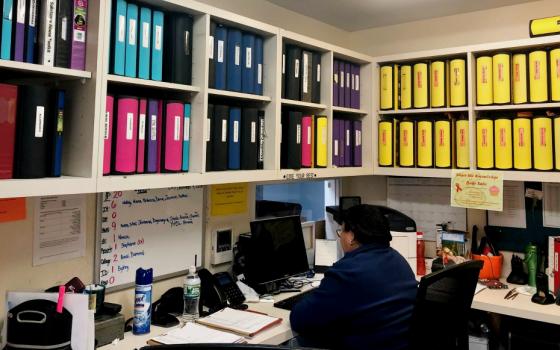Notes from the Field includes reports from young people volunteering in ministries of Catholic sisters. A partnership with Catholic Volunteer Network, the project began in the summer of 2015. This is our eighth round of bloggers: Sarabella Muise is a Good Shepherd Volunteer in New York City. This is Sarabella's fourth blog post. Read more about her.
______
Ever since college, my sweet and enthusiastic mother has told me, "Honey, companies like Google, Apple, Facebook, they're like little towns! They have all sorts of jobs for people of all different professional backgrounds. You don't have to be an engineer! And both engineers and non-engineers receive the benefits of working at a tech company. You get quality food at work, free access to a gym and other healthy lifestyle amenities like meditation rooms, competitive salaries that allow for a comfortable lifestyle ... the list goes on!"
I've heard this spiel more times than I can count over the last few years, and it came out at noticeably higher frequency as I approached my college graduation. My mother was — and is — very pro-working for a big-name tech company, for all the reasons she laid out in her elevator pitch and more. I was very against it.
For someone who grew up in Silicon Valley, known as the technology hub of the world, I just didn't understand what was so great about "tech." I have a liberal arts background and a combined interest in psychology and art, so it makes sense that my brain never fully understood engineering.
I often viewed tech products as a frivolous way to make people rich. For example, what really is "the cloud"? When I began to ponder my first move into the "real world" after college, I realized I was surrounded by an industry I didn't believe in, and frankly, didn't want any part of.
The culture of the industry felt toxic, even when I was a young kid. For example, when I was 10 years old, I had to choose which sport I wanted to play exclusively, so I could build a specialized skill and thrive in the "competitive" leagues. I was only 10! This also meant being switched from a parent-participation, "sing-songy" public elementary school to a uniform-wearing, test-taking private school because of fears that not attending a private middle school meant cutting off my chances of attending a private high school. That, in turn, meant virtually eliminating my chances of going to a good college and, therefore, ever becoming a successful human.
Talk about pressure!
There is no denying that there are countless ways recent technology has enriched our personal lives, our workplaces and our society as a whole. But a lot of negatives have come with those improvements — and not only for those of us who grew up close to the industry's core.
The huge increase in depression and anxiety we are seeing on college campuses today is often attributed, at least in part, to social media. The way people "curate" their lives to what they want to look like and how others compare their personal struggles to what is portrayed as perfection are not good for anyone's mental health. If this industry produced these abstract ideas-turned-products that make people feel so bad about themselves, why would I want to get involved?
As I neared the end of my college career in Silicon Valley, I saw classmate after classmate gain highly competitive internships at Apple, Adobe or LinkedIn, and then saw those internships turn into jobs and seeing those jobs equate to six-figure salaries. It gave me a warped view of money and how much I "should" be making to be "successful." It didn't seem fair that someone sitting behind a computer made exponentially more at 21 years old than a seasoned schoolteacher.
Already knowing about the opportunity to participate in a service year — which in my mind was an exact 180-degree change from the "evil" tech industry — and knowing that I could have the opportunity to serve in myriad places, I wanted to get as far away as possible from the tech bubble. I romanticized New York City, as many people do, as a city full of hard-working artistic types like myself, pursuing their passions.
Well, here I am in New York doing just that, and it took fewer than two months for me to realize the wildly narrow hole through which I was viewing the tech industry. What I once viewed as luxury products that improve the lives of those who already have ample resources — rather than uplifting those without them — I now view differently. I now see the necessity of these innovations for all types of people.
There are many daily tasks we complete at the group home where I volunteer and I'd say we do 90 percent of them the old-fashioned way. We keep 13 teenage girls' schedules straight with no Google calendar; track the girls' different moods and behaviors daily with no tracking app; calculate their spending and saving with no automatic algorithms; and communicate all this information between the residential life team, administrative team, the social services, health and finance teams without using Slack, a collaborative communication tool.
I almost immediately saw how crucial and helpful innovative technological products could be to the lives of people in need of services. Just to paint the picture clearly, we track everything with paper and pen. Everything. There are upward of 90 different binders in our one staff office alone, with countless different elements that need tracking.
Having an electronic database to hold all the complex data gathered in a single client's case over the course of a two-year stay would be an incredible improvement in efficiency and sustainability. If we could use a service like Google Calendar to monitor each girl's individual schedule, rather than trying to juggle all of them by memory, we could increase organization, productivity and headspace.
It is vital that the wide breadth of professionals in the building communicate with each other in order to give the girls the best care possible, so implementing a communication tool like Slack could radically improve the way staff is able to communicate with each other. Making our daily tasks more streamlined, efficient and organized with the help of technology would ultimately free up more time and energy to dedicate to our girls, which is why we are all there to begin with.
There must be a variety of factors as to why the latest and greatest technological advancements have not yet made it to our worksite — the first, and probably most important, being money. As a nonprofit agency, I would assume we don't have the funds to implement these technologies. But we are arguably the ones who need them most. Using outdated methods often takes time away from the clients we are all here to serve.
It didn't take a long time for me to see the link to the benefits of technology in almost everything we do in social services. I feel grateful to have walked both paths: the "tech-savvy" path and the one that may be behind the times, because it has showed me firsthand how much the bridge between the two matters.
Among many things in my service year so far, this is a drastic and radical realization for me. I will absolutely use this new perspective for the basis the rest of my career — whether that career stays the nonprofit/social work course or veers into tech, or meets on a bridge somewhere in the middle.
[Sarabella Muise is a Good Shepherd Volunteer at a therapeutic residence for adolescent girls in New York City.]



